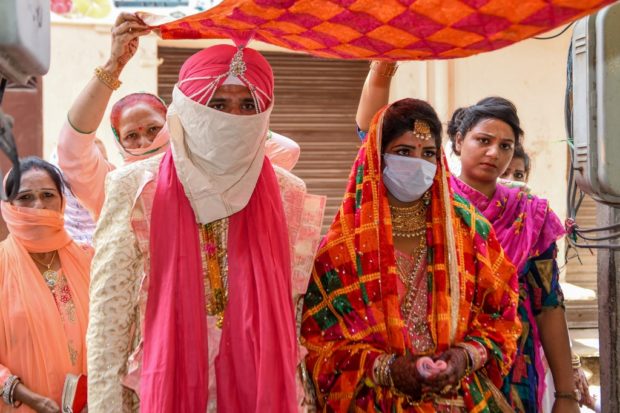It was a wedding like no other. There was no pomp and show, no big crowd, band, or horse accompanied the groom. An alarm rang every half an hour at the wedding hall. That was a cue for the guests to sanitise their hands using sanitisers being handed out by the family of the bride to the guests. It was a wedding in the time of Covid-19. This is how people are tying knot during pandemic.
Some love birds decided to get married and had made grand plans. Then came the coronavirus pandemic. Getting more than 50 people together became illegal, and inadvisable because of the risk of infection. So, a lot of couples decided to improvise and not organise a big show. They are strategizing everything — from managing the guests to organising food so that it can help them in tying knot during pandemic.
Some people who have big houses and are planning to get married in the house. The others who do not have such an option are looking for other measures. They are shifting to a hotel willing to accommodate. The couple has designed masks in two assorted colours — one for the bride’s guests and the other for the grooms. A family member is designated to sanitise all the jewellery and outfit. But would the couples not be agreed to the fact of tying knot during pandemic?
To ensure all the cousins and friends can take part in the joyous occasion, the couples are holding the various marriage functions over two days so that they could invite different sets of people for different events, keeping the number at 50 people per event.
The pandemic has shrunk the big, fat Indian wedding and financial advisers. Indian weddings are elaborate, with multiple ceremonies and large gatherings of up to 1,000. But amid the Covid-19 outbreak, the Home Ministry’s guidelines do not allow more than 50 guests. With the number of infections mounting every day, the restrictions are not expected to be eased soon.
Fewer guests mean smaller, cheaper weddings. To lure hesitant couples and drive business during the slowdown, hotels and banquet halls, for example, where 200-250 guests were initially accommodated, the charge has gone down from Rs 3.5-4 lakh to Rs 1.5-2 lakh. This includes the cost for sanitisation kits and decoration. This is the irony of tying knot during pandemic.
Parents who are spending on their children’s wedding, he said, should ideally give the excess money to the couple so that they have more security when they start their life together. Most of the couples now intend to get the marriage registered in court and throw a party for a small gathering of family and friends as it will not be safe for people to travel. Tying a knot during pandemic requires a lot of planning and strategizing.
A couple would have spent the money on the wedding and chances are, they would not think about it for more than a few days. If they invest the surplus and forget about it for 20 years, they will be doing themselves a favour.
For those planning to postpone their wedding, it would be a promising idea to move the funds kept aside for the wedding into an ultra-short duration or low duration bond fund. However, these people are refusing to let the lockdown regulations keep them from starting a new life and are tying knot during pandemic.
Related: Most of the parents want to send their children to school during pandemic

1 Comment